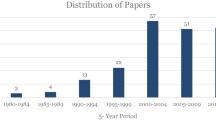Abstract
Jean-Luc Nancy is a contemporary continental philosopher who argues that the hope of fully unifying a community through work is problematic. This is because people cannot be reduced to their function as workers. Thus, community is, at best, inoperative. This article takes Nancy’s ideas of community and applies them to the notion of teamwork in business. It shows how in some literature on business teamwork, there is a desire to build a team through shared work experiences. It then explains Nancy’s view as to why this cannot work, and it enters into Nancy’s positive account of how a community should be seen as a web of people communicating and sharing with each other in a variety of ways. The practical conclusion the study draws is that team members need to be careful about allowing goal orientation to obfuscate the richness of the relationships that occur among team members. People need to explore all of the ways in which people share with each other rather than just those ways that advance a narrow set of goals. If the richness of those relationships is recognized, many new directions for business and for general human development may appear,
Similar content being viewed by others
References
Bevan, D. (2008). Continental philosophy: A grounded theory approach and the emergence of convenient and inconvenient ethics. In M. Painter-Morland & P. Werhane (Eds.), Cutting-edge issues in business ethics: Continental challenges to tradition and practice (pp. 131–152). New York: Springer.
Hutchens, B. (2005). Jean-Luc Nancy and the future of philosophy. Montreal: Mc-Gill-Queen’s University Press.
James, I. (2006). The fragementary demand: An introduction to the philosophy of Jean-Luc Nancy. Stanford, CA: Stanford University Press.
Katzenbach, J., & Smith, D. (2004) The discipline of teams. In Harvard Business Review on Teams that Succeed (pp. 1–25). Boston, MA: Harvard Business School Press.
Kohn, S., & O’Connell, V. (2007). Six habits of highly effective teams. Franklin Lakes, NJ: Career Press.
Luecke, R. (2004). Creating teams with an edge: The complete skill set to build powerful and influential teams. Boston, MA: Harvard Business School Press.
Nancy, J.-L. (1991) The inoperative community (P. Connor, L. Garbus, M. Holland, & S. Sawhney, Trans.), Minneapolis: University of Minnesota Press.
Nancy, J.-L. (2000) Being singular plural (R. Richardson, & A. O’Byrne, Trans.) Stanford, CA: Stanford University Press.
Singer, B. (2004). The ABC’s of building a business team that wins. New York: Warner Business Books.
Snow, H. (1992). The power of team building: Using ropes techniques. Toronto, ON: Pfeiffer and Co.
Author information
Authors and Affiliations
Corresponding author
Rights and permissions
About this article
Cite this article
Bertland, A. The Limits of Workplace Community: Jean-Luc Nancy and the Possibility of Teambuilding. J Bus Ethics 99 (Suppl 1), 1–8 (2011). https://doi.org/10.1007/s10551-011-1156-7
Published:
Issue Date:
DOI: https://doi.org/10.1007/s10551-011-1156-7




